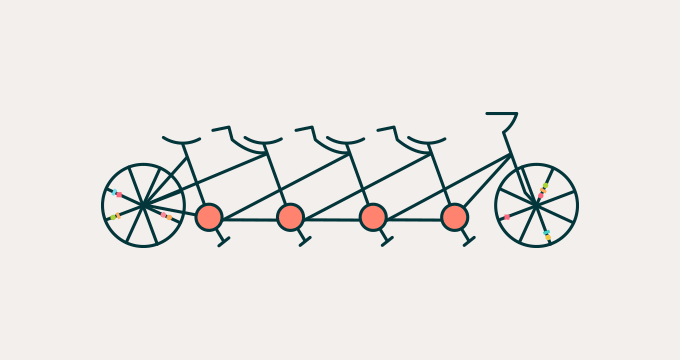Article • 3 min read
Customer experience is a team sport
Por Mark Smith, Content marketing manager
Última actualización en April 23, 2019
Sometimes even the most experienced agents will face a customer service issue so complex that it leaves them stumped. That’s understandable—after all, as the technology driving many products and services becomes increasingly complicated, the need for guidance from experts on other teams has become commonplace.
Unfortunately, cross-departmental collaboration can be tricky—whether it’s teams working on different systems or conversations between agents and experts getting lost in the mix, the end result often ends up being delayed resolution times for customers. And research shows that 46 percent of customers still clearly remember those negative customer service experiences two years later, and those memories directly impact purchasing decisions. The data is clear: input from experts leads to a better customer experience.
So how can agents bring in (and retain) that critical expertise? The key is to treat customer service like a team sport—and that means streamlining collaboration and communication, which requires teams having the right set of tools.
Slack keeps the conversations going
The ways companies communicate with customers have changed considerably over the past decade, whether it’s via social media or chatbots on websites—and the same can be said for how those businesses handle internal communications. Leading that charge is Slack, the collaboration hub for work that integrates seamlessly with a wide range of business tools, including ones used for customer service.
For example, Slack works with the Zendesk Support’s Side Conversations feature, part of the Collaboration add-on, which allows agents to reach coworkers and third-party partners via Slack channels. This gives the team the ability to centralize all interactions and conversations within Support, reducing the need to juggle multiple collaboration tools. With all communication related to the ticket being unified, that means faster resolution times, better retention of expert knowledge, and improved reporting.
Magic Leap gets experts and agents on the same page
For Magic Leap, encouraging efficient collaboration between agents and internal experts is essential, since the company’s mobile spatial computing headset is a complex piece of technology that a small army of independent developers are busy building applications for—and sometimes those developers need a helping hand. For Callie Holderman, senior manager of developer relations, and her team, being able to track down information that augmented reality creators need means frequent communication with Magic Leap’s engineering team. However, Holderman and her team discovered that those Slack conversations tended to get lost, which posed a serious problem since those interactions are a gold mine of useful knowledge that could be leveraged not just for agents but as self-service content for developers.
“That’s where we saw that breakdown happening—the engineer would respond, but we wouldn’t be able to see from the Zendesk side when they replied to the customer,” Holderman says. “And in reassigning tickets, we would lose track of the conversation.”
Holderman’s team turned to a few different workarounds, such as reaching out on Slack and then linking to a Zendesk ticket from there, but those proved to be manual and cumbersome tactics. Also, the knowledge added to that particular ticket lived in Slack alone, isolated from the customer question in Zendesk, so content was not located in a central location—not an ideal outcome for anyone involved.
However, by implementing Slack and Side Conversations, Holderman’s team began to capture that knowledge in Zendesk, which met the needs of everyone involved: the engineers could continue to share their expertise via their preferred tool, Slack, and agents could easily access archived conversations for context and future problem-solving, no matter who was assigned the ticket.
This change, Holderman says, has led to smoother operations and more frequent conversations between agents and engineers, and it’s also revealed trends in support requests, providing a “news feed for everything I need to know.” And, as Magic Leap continues to scale—having gone from a handful of employees working in a garage to 1,600 workers in just a few years—being able to access troves of expert knowledge will help Holderman and her team continue to serve customers eager to build new worlds in spatial computing.
Hear more from Callie Holderman and how Magic Leap leverages Side Conversations.
